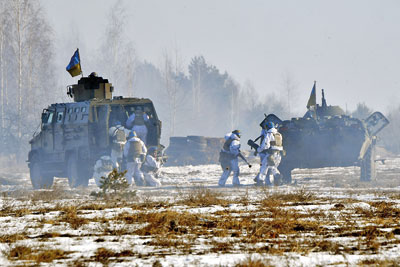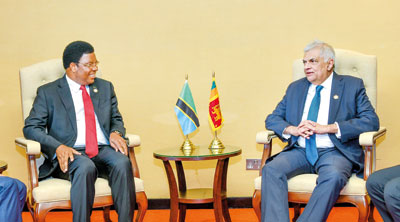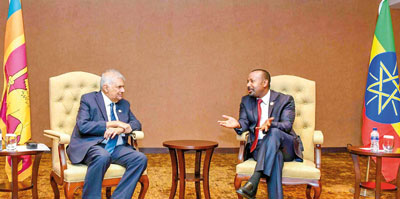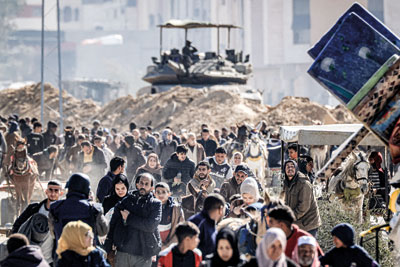Arts
Reshaping Sri Lanka’s foreign policy amidst a turbulent world order
View(s):By Dr. Harinda Vidanage
The mood in the global political landscape over the last few years of the conduct of international affairs between states, non-state and sub-state actors has been quite pensive. Pundits of foreign affairs, diplomacy, and policy leaders especially from the geopolitical West signal caution and alarm as they claim that the stable international order that was experienced since the end of the Second World War is increasingly vulnerable to a set of forces that threatens to undermine and unravel the fulcrum that holds everything together in the 21st century.
US Secretary of State Anthony Blinken in a recent speech at Stanford University addressing Silicon Valley leaders claimed that the country has come to an inflection point as he announced the ending of the post-cold war era succeeded by a race and competition that is unfolding to shape what comes next. He went further to state that the evolving global competition will have technology at its core. Similarly, the German Chancellor Olaf Scholz writing to Foreign Affairs magazine argued that a Global Zeitenwende is what the world is confronting, meaning a great upheaval.

Ukrainian servicemen take part in military exercises by assault units in Zhytomyr region on January 30 amid Russian invasion in Ukraine. (Photo by Sergei SUPINSKY / AFP)
All these concerns echo one clear message that the so-called world order is in transition. This will shape every other process of global interactions and lead to an array of synchronized headwinds that will batter smaller nations in the next half to one decade.
The complication for Sri Lanka is not just the global complexity mentioned above; it is the immediate turbulence created by a war that is drawing Europe, America and even parts of West Asia down a dangerous path where each day the Ukraine-Russia conflict extends, it creates shocks and reverberations that undermine the processes of governance, norms, security architecture of Europe and America’s role in the trans-Atlantic security calculus. Similarly, the conflict in Gaza is drawing a deadly cocktail of players from state to sub-state levels that seems to be feeding the fire and growing akin to a phoenix that can burn the region with unending war.
In this synthesis of global transformations, the key macro development is the intensification of the rivalry of the century. That is the tensions and competition marking US-China relations and for Sri Lanka which sits in the Indian Ocean, the full force and brunt of the thrusts of Indo Pacific strategy of the United States and related strategic formations from QUAD, AUKUS to other mini-laterals and China’s ambitious Belt and Road Initiative are felt and experienced.

Looking to Africa: President Ranil Wickremesinghe meeting the Tanzanian
Sri Lanka’s contemporary outlook
Sri Lanka’s tryst with global politics is not just shaped by all these variables and forces it also has deep domestic compulsions and domestic idiosyncrasies that are a cumulative result of the failure of former administrations to articulate robust foreign policy, a comprehensive national security policy and a pragmatic defence strategy. Since emerging from a three-decade war, Sri Lanka was totally blindsided to the rapid and unprecedented transition of the strategic properties of its neighbourhood and the evolving global transitions, the geopolitics that outpaced the evolution of our own foreign policy framework with no real strategic assessment undertaken. The necessity that drives Sri Lanka’s foreign policy future is finding ways and means to achieve a sort of strategic autonomy to navigate the above uncertainty by introducing a set of robust foreign policy pillars.
The current administration has embarked on an ambitious and pragmatic effort to align our foreign policy in a manner to address the immediate challenges that have shaken the country and to place Sri Lanka in the global arena as a responsible stakeholder conscious of the demands of global governance and guided by time-tested nonalignment policies to avoid falling prey to strong geopolitical undercurrents. There is a distinct emergence of a set of foreign policy pillars that were absent in Sri Lankan foreign policy articulations for a great period. These priority areas are economic diplomacy, strategic nonalignment, seeking a role in global challenges such as climate change, energy transition, information technologies and artificial intelligence and national security.

Ethopian leaders at the recent NAM summit in Uganda
The President has directed that the foreign policy establishment work on a dynamic set of frameworks that enable economic diplomacy to be central to the new efforts that enable Sri Lanka to engage with the developed world, especially to navigate key stakeholders that facilitate our debt restructuring. The efforts have shown significant success. Achieving the green light to debt restructuring is no easy task. Zambia which was so optimistic about its restructuring in 2023, which was to be the blueprint for other notable debt stressed African nations like Ghana and Ethiopia did not make it through despite all optimism. Thus, Sri Lanka’s economic diplomacy success remains underrated.
A perennial mistake that some policy makers committed when it came to Sri Lanka has been the calibration of the India-Sri Lanka relations. It is imperative that Sri Lanka understand the regional and global foreign policy compulsions of India and its aspirations since the Modi administration came to power. Sri Lanka’s foreign policy administration was required to maintain a constant calibration of its approach to Delhi and swiftly make course corrections when necessary.
Whilst it is no easy task to manage the regional hegemony, it has to practised with pragmatism and diplomatic sincerity. It can be observed that Sri Lanka is doing this course correction and this approach has paid dividends in securing India’s support for immediate relief from the economic crisis and India’s steadfast support in navigating the IMF regime and fast tracking the debt restructuring process. There remains the necessity to evolve clear and dynamic policy approaches to reap the best benefits and security by being consistent in its relationship with Delhi. The same is required especially in dealing with United States, China, and the European Union. Mixed and confusing messaging can short circuit any gain. Thus consistency is a key best practice that the foreign ministry and ancillary institutions and departments have to evolve.
In the realm of emerging strategic competition especially in dealing with Indo Pacific strategy of the United States that has the backing of key nations such as Japan and Australia and India’s strategic alignment plus Indo-Pacific strategies of the European Union, Sri Lanka has managed to convert our space into a space of dialogue rather than disruption. Indo-Pacific strategy and its articulations have been approached from a perspective where Sri Lanka has encouraged the dialogue to take place and at the same time facilitating as a venue while China’s Belt and Road initiative is not dislodged or discarded.
This navigation is possible as articulated by President Ranil Wickremesinghe. He has chosen the ideology of Sri Lanka first, which entails that it will do what is best for its national interest whilst accepting the realities and ambitions of the regional and extra regional great powers.
The approach enables the new strategic frameworks of the great powers to be presented and debated and Sri Lanka as a strategic venue not a strategic ally and providing the tacit understanding that the island nation’s unwavering nonalignment enables the facilitation of divergent viewpoints. Our foreign policy now and in future is shaping the Indo-Pacific narrative to the best of our interests by acknowledging its strategic sensitivity but not becoming part of any institutional architecture. Sri Lanka continues to be the venue harnessing the age-old mantra of strategic location to our advantage and minus the efforts to play major powers against each other but to make them converge in a safe zone in the Indian Ocean.

An Israeli battle tank is deployed to guard a position as displaced Palestinians flee from Khan Yunis in the southern Gaza Strip on January 30 amid the ongoing conflict between Israel and the Palestinian militant group Hamas. (Photo by Mahmud Hams / AFP)
New avenues of connectivity
In forging a 21st Century enabled foreign policy, a state is compelled to take on the many disruptions that impact the global political landscape. These disruptions fall into a multitude of categories yet some of the disruptions that must be addressed are climate change and resilience initiatives, technological disruptions both from innovation to a cyber ecosystem that has totally rewired every aspect of human life. Thus, the environment, and a cyber eco system remain primary foreign policy drivers where countries have cyber policies incorporated into their security strategies.
Another aspect is understanding the regional dimensions of the 21st century that has brought in many new constellations of multi-lateralism and mini lateral arrangements. The initial focus was Asia, but it also should be noted that Africa as a continent with its 54 nations is going through a sea change in outlook. African nations have deep historical relations and importance to Sri Lanka in the last century especially with the Non-aligned Movement. Today’s Africa is an epicentre of economic prosperity and Sri Lanka needs to be connected to that regional hub.
The current administration has been keen on addressing issues such as climate change, the pledge to establish a Climate University, and the commitment to global climate standards. Initiating discussion about climatic discourses and climate justice has been one strategic manoeuvre that has been adapted. Such themes transcend the current geopolitical ossification.
Sri Lanka has championed the need for Asian connectivity and has consistently addressed the issues of a Global South and the injustices of the global climate and financial order which sometimes does not encourage the Global South to reap the benefits of its commitment to climate goals. Sri Lanka has created a discourse recently that provides us space to manoeuvre with topics that do not hold us prisoner to the larger geopolitical competition that is unfolding. Instead these themes of levelling the global financial system, a climate justice makes Sri Lanka play a key role as a responsible stakeholder from the Global South.
Sri Lanka has had a history of relations with Africa but with no real foreign policy imperative. The recently announced ‘’Look Africa “policy position will enable Sri Lanka to pursue mainly its economic diplomacy with the region that is deemed the second fastest growing region in the world. As per economic outlook, it is predicted that 12 of the 20 fastest growing economies in 2024 will be in Africa. Thus, the tilt towards Africa does show promise. The President’s recent visit to Uganda, one of the African economies with great promise is significant. Uganda along with Ethiopia, Kenya, Rwanda and Tanzania as highlighted in the latest report on Africa Economic Intelligence Unit make up some of the fastest growing economies.
Future prospects
Sri Lanka’s evolving foreign policy thinking and the goal oriented foreign policy processes and the strengthening of the institutions especially the capacity building efforts of the Ministry of Foreign Affairs all point to an effort to accommodate the reality of the evolving global order and prepare Sri Lanka to reap the benefits and shield from its aftershocks. In the absence of a framework or common set of pillars of foreign policy for a long time, the current efforts by President Wickremesinghe bear the hallmarks of an effort to forge a comprehensive foreign policy framework.
The framework, if established sooner than later, will have a better chance to adapt and mitigate the effects of a world increasingly in flux. A foreign policy can never be introduced with a safety shield that screams, “future proofed’’ but Sri Lanka after many decades stands a chance to be future ready in its engagement with the world.
(The writer is Director, International Relations and Director, Centre for Strategic Assessment (CSA), Kotelawala Defence University (KDU))

